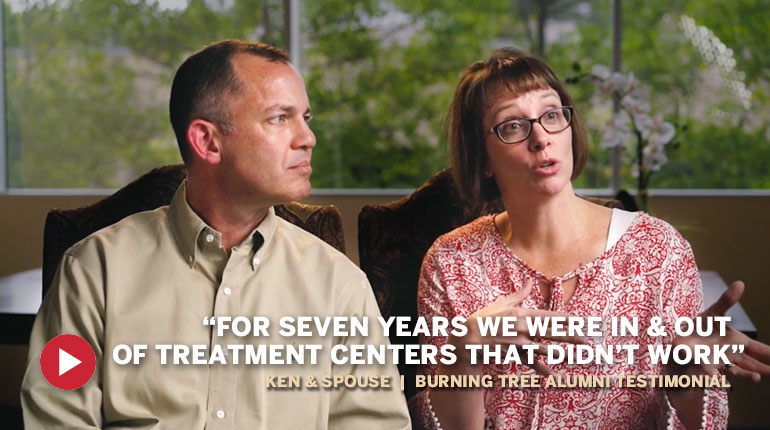Burning Tree Ranch Alumni Ken & His Spouse Share Their Experience in Recovery
Video Summary:
Ken & Connie – married before and after long-term treatment with Burning Tree – share their experience as a couple undergoing the program. They recount some of the challenges they faced early on related to life and Ken’s alcohol use. Realizing the ineffectiveness of shorter treatment programs, they pursued a program that gave them the time Ken needed to better understand himself and find sobriety.
Ken describes how the long-term treatment program allowed him to reflect on his values and role as a husband and father. Connie offers her insight from a loved one’s perspective during the difficult period of separation while Ken attended the inpatient portion of treatment.
Through their testimonial, this alumni couple gives other families a realistic perspective of what it’s like to confront codependency and undergo long-term residential treatment at Burning Tree Ranch.
Read: Video Transcript
[Video opens with married couple Ken & Connie sitting side-by-side. Ken introduces himself first.]
My name is Ken Coffee.
[Connie introduces herself and begins speaking.]
And my name is Connie Coffee. We met when we were 17 years old in high school.
We had been married for seven years when we had our first son who received an autism diagnosis. At that same time, I was pregnant with our second child and had our second baby, and I became very sick with chrones disease, so I had to be put in the hospital.
At that point was the switch where I really noticed – because I was in the hospital for about two weeks – that his drinking now went to another level.
I now look back on it and wonder why didn’t we get to Burning Tree sooner? Because basically for seven years we were in and out of treatment centers that didn’t work. The thing that Ken needed was time – time to kind of sit in his brain to heal.
[Ken resumes speaking again.]
I needed the platform to just sit with myself and see who I was, what I was and where I was at that time. Because I wasn’t a husband, I wasn’t a father. I was the shell of a men at that point.
Okay, what can I become – coming to terms with what I had become, what did I want to be? And the counselors, specifically the one that I had for the second half of my stay, her goal was to say, ‘Ken, who are you gonna be as a man, and a husband, and a father now?’
And my aftercare case manager called Connie and said, ‘Ken seems like he’s doing pretty good. He’s hitting on all of his marks; he’s doing great, so it’s about time we think about moving him home.’
And Connie said no.
[Connie interjects gently with a laugh.]
No, not yet. He hadn’t had enough time.
[Ken resumes discussing his experience in treatment.]
– The feedback I got, so I got a call from my case manager who said, ‘Ken, Connie’s still mad… and you might be staying with us for a little while longer.’
That was hard. I mean, we laugh about it now, but at the time it was tough, because I was thinking, ‘What’s it gonna take?’
But it was really a gut check for me, like what was I doing this for? Am I doing it – again – for selfish motives and reasons? Am I doing it just to get back in the house? Or am I doing it because I want to get sober, and I want to be a husband, a father, and a man?
And so I said okay, if Connie’s not ready, and it’s not right, then it must not be time.
[Connie resumes speaking towards the conclusion of the video.]
So one thing from a loved one’s perspective, if you’re looking at your loved one being away for a year or a year and a half – one thing we have to learn is that we’re as addicted to them as they are to their drug. So that separation really helps us to realize that we are people without them, and as hard as it was being a single mom, it helps you learn you can do things yourself. You don’t have to rely on this person so much.





